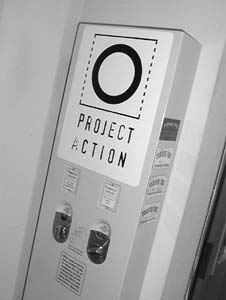Two-Bit Logic
Condom machines for teens go begging for homes in 'conservative' market
By Traci Hukill
The condom just might be the single most compelling reason for monogamy.
Sure, it prevents pregnancy, but lots of things do that, and without looking bad, smelling bad and feeling bad. And yes, it prevents the transmission of deadly disease--but that's what makes the case for healthy monogamy so strong.
The condom's contribution to the complex symphony that is amour, on the other hand, can pretty well be reduced to a note of absurdity: the human penis dressed for bed in too-tight rubber pajamas. It looks silly and a little sad, the same way dogs in sweaters do.
No matter how incongruous the sight of a hygenically sheathed member, however, it can't compete with the condom's first appearance on the set for sheer awkwardness. An evening of perfectly orchestrated courtship maneuvers can be humming along, perhaps escalating nicely into a frenzied grope session, when the proceedings grind to a halt, someone paws around in a drawer or a wallet for the prophylactics (or, worse, knows exactly where they are) and starts fumbling with the foil packaging.
Pulses slow. Respiration returns to normal. The mood limps along with a broken leg, the rider slumped in the saddle.
But guess what? That's just too bad. This is the '90s, and condoms are a fact of life. While it's true that practically everything about them is a little embarrassing, from paying for them while some little old lady in line looks on to pretending not to know where they are when it's time to whip them out (it's no good to appear presumptuous) to getting the suckers to stay on, it's about time we got used to them. And if we're smart, says Anthony Marek, we'll teach our youth to get used to them too.
Marek is project coordinator for Project Action, a nonprofit group devoted to preventing teen pregnancy and STDs. Besides organizing peer counselors to help teens cope with pressures surrounding sex and launching a media campaign that will show up on billboards and buses this spring, Project Action also hopes to install 60 machines that dispense low-cost (25 cents each) condoms at places where teens hang out.
Marek describes the three main reasons teens don't normally buy condoms: embarrassment, cost and convenience. "If they're in a situation where they're downtown hanging out in a cafe and they hook up with somebody there, they're not exactly going to ride the bus to Walgreens and spend the money to buy a dozen condoms before they go home with that person. And they're not going to want to go into a store and buy condoms with adults looking down their noses at them."
Good point. There's only one reason people buy condoms: They hope they're going to get laid soon. It's embarrassing enough to an adult to have that knowledge made public at the cash register, but for a teen the shame factor can be crippling. Far preferable to walk over to one of Project Action's plain white vending machines, fish around in purse or pocket for a quarter and walk away three seconds later with an easy-to-open, bilingually packaged Protocol condom--without ever having to leave the party.
Marek clarifies that Project Action is not about giving teens the green light to bop around the clock. The peer-counseling workshops held at schools and youth-serving agencies--in which AmeriCorps volunteers discuss peer pressure to have sex, proper communication and abstinence with teens--encourage caution above all. But, says Marek, "people are going to have sex. We can't stop that. But we can encourage the consistent and correct use of latex condoms to prevent pregnancy and the spread of STDs."
So far the program, just two weeks old, has succeeded in placing two vending machines in local hangouts--Radio Free Records and Pierce Ink, both located at 325 S. First St. in the Dohrmann Phoenix Building. With merchant cooperation Marek hopes to place his machines in cafes, movie theaters and pizza joints, but it's not easy here.
"San Jose is more progressive than, say, Texas," Marek points out, "but it's not like San Francisco. The thing we hear most often from merchants is 'No, thank you, we're very conservative.' And I say to them, 'This is a conservative program. It's about preserving the future of our youth.' "
Marek hopes Mayor Hammer will grasp the subtlety of that verbal equation. He'd like to install some 30 machines in libraries and teen recreation centers and needs her support in order to do so. He's already begun to actively court her support and hopes to have won it by month's end.
Meanwhile Marek continues his campaign to get Project Action machines in teen hangouts. "People want to do this," he says, "but they're afraid."
[ San Jose | Metroactive Central | Archives ]
Copyright © Metro Publishing Inc. Maintained by Boulevards New Media.
![]()

For more information about Project Action, call 243-0222, extension 243.
From the February 19-25, 1998 issue of Metro.
![[Metroactive Features]](/features/gifs/feat468.gif)